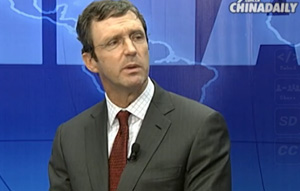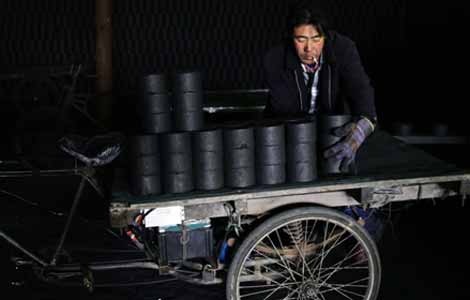Residents near pipeline blast demand relocation
Updated: 2013-11-26 01:33
By He Na and Xie Chuanjiao in Qingdao (China Daily)
|
||||||||
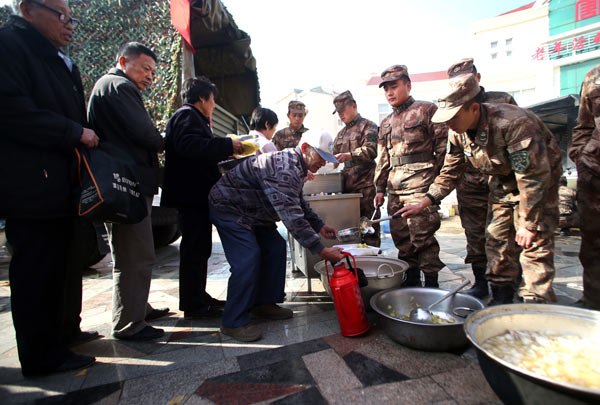 |
|
Broken windows in an apartment building after the pipeline blast on Friday in Qingdao, Shandong province. Repair workers began to fix windows for free on Monday. Photos by Zou Hong / China Daily |
Three days after a crude oil pipeline explosion in Qingdao, Shandong province, uneasy residents are demanding to be relocated.
Calling the pipeline a "time bomb" that will explode again, they fear that returning to their damaged homes is dangerous.
They also want to know how the government and Sinopec, China's largest oil refiner, plan to guarantee their safety in future and compensate them for their losses.
"I've had a nightmare every night since the explosion," said Yu Lan, 44, resident of the Beihai Park community close to the center of the blast and one of the areas most severely hit. "I cannot live here anymore, and the government has to give us an explanation and provide a solution."
One of Sinopec's underground pipelines exploded on Friday morning, along several main roads in Huangdao district. The huge blast killed 55 and injured 136, with nine still missing.
Officials said the blast was caused by crude oil that had leaked from a ruptured pipeline into subterranean storm drains.
At a news conference on Monday, authorities said no children in the blast area had been injured.
Most schools and kindergartens resumed classes on Monday, but students of Huangdao Development Zone No 2 Middle School will transfer temporarily to other school campuses this week.
By 5 pm, electrical power and water services had resumed, and heating supplies had been restored to about 85 percent of the affected homes, authorities said.
Yu, the Beihai Park resident, was working at a nearby factory when the explosion happened. She rushed home and saw several bodies lying in front of her community's entrance.
"The scene was very bloody, and some body parts were scattered around," she said. "The majority of the victims are our old neighbors. The scene keeps playing through my mind. I only have one apartment, and I don't want to live in fear for the rest of my life."
Yu now carries a small bag that contains her permanent household registration, ID cards and bank account information.
"I even sleep with this bag so people will know who I am if another accident happens," she said.
Yu's concerns were echoed by other residents, who said that renovation of their homes won't meet their needs. They said the only way to resolve the safety concerns and ease their nerves is relocation.
Qu Ronglu, 53, who was busy repairing windows, is worried about underground power lines because they are complex and run close to one another.
Those renting apartments have already moved out of the community, Qu said.
"We strongly objected to the building of the chemical plant nearby, but our voice was raised in vain. Now the underground cables and the chemical plants are two time bombs," Qu said. "Who can live calmly with this huge potential safety hazard. Relocation is the only way to solve our problems."
Qu chose not to live in a hotel the government had arranged for residents for fear thieves might get into her apartment through the broken windows..
"I lived the past three days in fear, and often woke up screaming. It's not a normal life for human beings," she said.
Her neighbor Li Fengcai, 74, who spent the past three days in his son's home far from the accident, had returned to collect some daily necessities. He said he had been planning, before the explosion, to sell the house and buy a new one near his son.
"That plan has to be suspended," Li said. "Who wants to live on a time bomb? The property value has plummeted."
Neglect and misconduct
Friday's pipeline blast presents a serious safety issue, and neither the oil company nor the local government can avoid responsibility, said Yang Dongliang, the head of the State Council investigation team.
Yang told Xinhua News Agency that the investigation will focus on the cause of the pipeline leak and explosion, as well as on the reasons for the slow evacuations.
"There are some major problems," Yang said. "The pipeline layout is not scientific. There was neglect in pipeline management. And there was misconduct in the emergency response."
The investigative report will be made public, he said.
"People's security should always come first, and we urge local governments across the country to strengthen safety supervision," said Yang, who is also the director of the State Administration of Work Safety.
Rescue work progressing
Workers wearing colored hard hats were busy on Monday restoring power supplies cut off by Friday's explosion. Both sides of the road were screened by two-meter-high boards, and police were guarding the area.
Significant damage was done to power lines, but all power had been restored as of Monday afternoon, as had water supplies.
"The explosion was so powerful that the infrastructure and various kinds of power lines were severely damaged, making it more difficult to restore power," said an official from the State Grid Corporation who declined to be named.
Qingdao Lantian Rescue, a professional non-government team specializing in emergency response, was carefully searching the blast area, hoping to find any missing people.
They worked around the clock for three days, the fatigue showing on their faces.
"We won't give up. We will hunt for every clue," said team leader Li Yanzhao.
On Sunday afternoon, President Xi Jinping visited the injured and inspected the progress of rescue work. He also heard reports detailing the accident.
According to Xinhua, Xi stressed that investigation of the accident should be accelerated, and that those responsible must be dealt with in accordance with the law.
The ruptured pipeline was found leaking early Friday and exploded seven hours later as workers tried to repair it.
Sinopec said the pipeline was put into service in 1986. It is 248 kilometers long and carries 10 million tons of crude oil every year.
Hu Qing contributed to this story
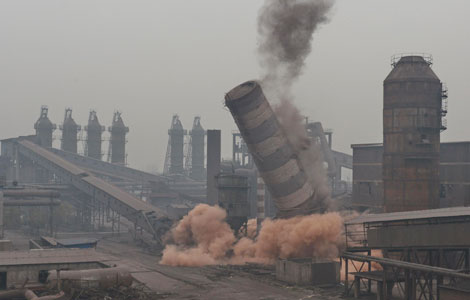
 Cutting output to help ease pollution
Cutting output to help ease pollution
 Sochi Olympic flame plunges into largest freshwater lake
Sochi Olympic flame plunges into largest freshwater lake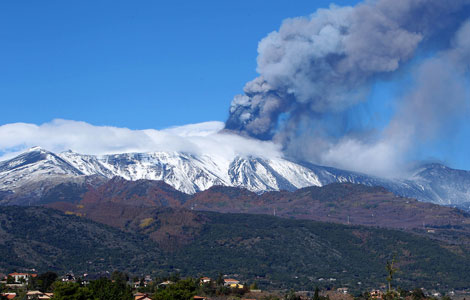
 Mount Etna erupts, lighting up Sicilian sky
Mount Etna erupts, lighting up Sicilian sky
 Deal reached in Iranian nuclear talks
Deal reached in Iranian nuclear talks
 Bitter pill for traditional Chinese medicine
Bitter pill for traditional Chinese medicine
 Rescuers work in Tacloban
Rescuers work in Tacloban
 Roar of the East being heard
Roar of the East being heard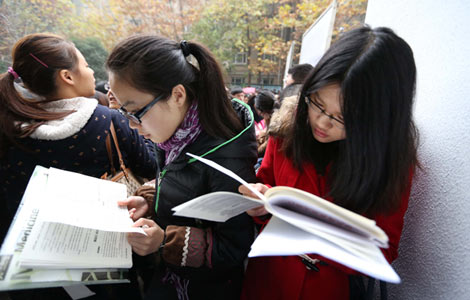
 1.12m seek government jobs
1.12m seek government jobs
Most Viewed
Editor's Picks

|

|

|

|

|

|
Today's Top News
US irresponsible for suspending ITA negotiations
Vice-Premier ends US trip in NYC
China to target price fixing: report
Shenyang to offer 72-hour visa-free stays
Japanese PM concerned over China's air defense zone
Creating the next Asian global name
Deal reached in Iranian nuclear talks
Getting to know Tianjin
US Weekly

|

|
